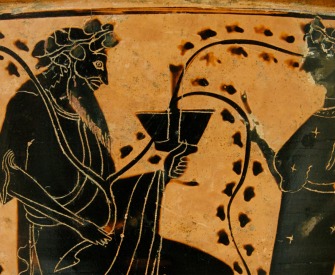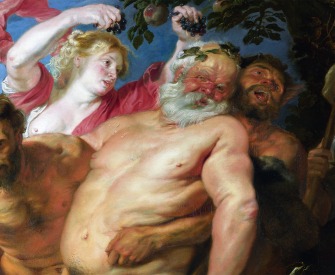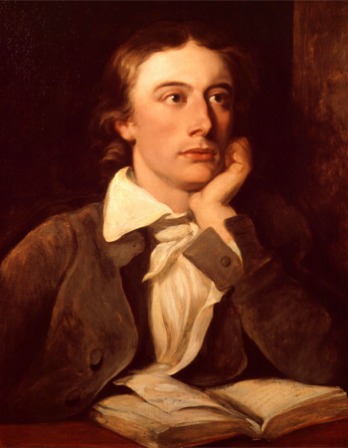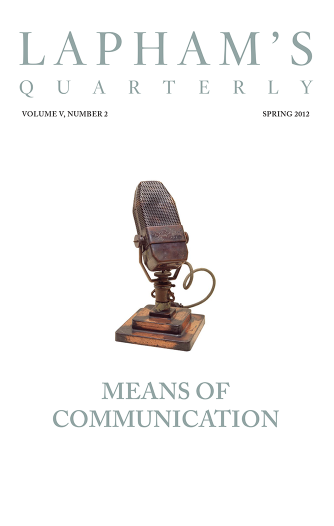Feasts must be solemn and rare, or else they cease to be feasts.
—Aldous Huxley, 1929Tasting the Sweet and Sour
Tobias Smollett is definitely tired of London.
Shall I state the difference between my town grievances and my country comforts? At Brambleton Hall, I have elbow room within doors, and breathe a clear, elastic, salutary air. I enjoy refreshing sleep, which is never disturbed by horrid noise, nor interrupted, but in a morning, by the sweet titter of the martlet at my window. I drink the virgin lymph, pure and crystalline as it gushes from the rock, or the sparkling beverage, home-brewed from malt of my own making; or I indulge with cider, which my own orchard affords, or with claret of the best growth, imported for my own use by a correspondent on whose integrity I can depend; my bread is sweet and nourishing, made from my own wheat, ground in my own mill, and baked in my own oven; my table is, in a great measure, furnished from my own ground; my five-year-old mutton, fed on the fragrant herbage of the mountains, that might vie with venison in juice and flavor; my delicious veal, fattened with nothing but the mother’s milk, that fills the dish with gravy; my poultry from the barn door that never knew confinement but when they were at roost; my rabbits panting from the warren; my game fresh from the moors; my trout and salmon struggling from the stream; oysters from their native banks; and herrings, with other sea fish, I can eat in four hours after they are taken. My salads, roots, and potherbs, my own garden yields in plenty and perfection, the produce of the natural soil, prepared by moderate cultivation. The same soil affords all the different fruits which England may call her own, so that my dessert is every day fresh gathered from the tree; my dairy flows with nectareous tides of milk and cream, from whence we derive abundance of excellent butter, curds, and cheese; and the refuse fattens my pigs, that are destined for hams and bacon. I go to bed betimes, and rise with the sun.
Now, mark the contrast at London. I am pent up in frowsy lodgings where there is not room enough to swing a cat, and I breathe the steams of endless putrefaction; and these would undoubtedly produce a pestilence if they were not qualified by the gross acid of sea coal, which is itself a pernicious nuisance to lungs of any delicacy of texture. But even this boasted corrector cannot prevent those languid sallow looks that distinguish the inhabitants of London from those ruddy swains that lead a country life. I go to bed after midnight, jaded and restless from the dissipation of the day. I start every hour from my sleep at the horrid noise of the watchmen bawling the hour through every street, and thundering at every door—a set of useless fellows, who serve no other purpose but that of disturbing the repose of the inhabitants—and by five o’clock I start out of bed, in consequence of the still more dreadful alarm made by the country carts and noisy rustics bellowing green peas under my window. If I would drink water, I must quaff the mawkish contents of an open aqueduct, exposed to all manner of defilement, or swallow that which comes from the river Thames, impregnated with all the filth of London and Westminster. Human excrement is the least offensive part of the concrete, which is composed of all the drugs, minerals, and poisons used in mechanics and manufactures, enriched with the putrefying carcasses of beasts and men, and mixed with the scourings of all the washtubs, kennels, and common sewers, within the bills of mortality.
This is the agreeable potation extolled by the Londoners as the finest water in the universe. As to the intoxicating potion sold for wine, it is a vile, unpalatable, and pernicious sophistication, balderdashed with cider, corn spit, and the juice of sloes. In an action at law, laid against a carman for having staved a cask of port, it appeared, from the evidence of the cooper, that there were not above five gallons of real wine in the whole pipe, which held above a hundred—and even that had been brewed and adulterated by the merchant at Oporto. The bread I eat in London is a deleterious paste, mixed up with chalk, alum, and bone ashes, insipid to the taste and destructive to the constitution. The good people are not ignorant of this adulteration, but they prefer it to wholesome bread, because it is whiter than the meal of corn. Thus they sacrifice their taste and their health, and the lives of their tender infants, to a most absurd gratification of a misjudging eye, and the miller or baker is obliged to poison them and their families in order to live by his profession. The same monstrous depravity appears in their veal, which is bleached by repeated bleedings, and other villainous arts, till there is not a drop of juice left in the body, and the poor animal is paralytic before it dies: so void of all taste, nourishment, and savor that a man might dine as comfortably on a white fricassee of kid-skin gloves or chip hats from Leghorn.
As they have discharged the natural color from their bread, their butcher’s meat, and poultry, their cutlets, ragouts, fricassees, and sauces of all kinds—so they insist upon having the complexion of their potherbs mended, even at the hazard of their lives. Perhaps, you will hardly believe that they can be so mad as to boil their greens with brass halfpence, in order to improve their color, and yet nothing is more true. Indeed, without this improvement in the color, they have no personal merit. They are produced in an artificial soil and taste of nothing but the dunghills from whence they spring. My cabbage, cauliflower, and asparagus in the country are as much superior in flavor to those that are sold in Covent Garden, as my heath mutton is to that of St. James’ market, which, in fact, is neither lamb nor mutton but something betwixt the two, gorged in the rank fens of Lincoln and Essex, pale, coarse, and frowsy. As for the pork, it is an abominable, carnivorous animal, fed with horse flesh and distillers’ grains, and the poultry is all rotten, in consequence of a fever, occasioned by the infamous practice of sewing up the gut, that they may be the sooner fattened in coops, in consequence of this cruel retention.
Of the fish I need say nothing in this hot weather, but that it comes sixty, seventy, fourscore, and a hundred miles by land carriage; a circumstance sufficient, without any comment, to turn a Dutchman’s stomach, even if his nose was not saluted in every alley with the sweet flavor of fresh mackerel, selling by retail. This is not the season for oysters; nevertheless, it may not be amiss to mention that the right Colchester are kept in slime pits, occasionally overflowed by the sea—and that the green color, so much admired by the voluptuaries of this metropolis, is occasioned by the vitriolic scum which rises on the surface of the stagnant and stinking water. Our rabbits are bred and fed in the poulterer’s cellar, where they have neither air nor exercise; consequently, they must be firm in the flesh and delicious in flavor—and there is no game to be had for love or money.
It must be owned that Covent Garden affords some good fruit, which, however, is always engrossed by a few individuals of overgrown fortune at an exorbitant price—so that little else than the refuse of the market falls to the share of the community—and that is distributed by such filthy hands, as I cannot look at it without loathing. It was but yesterday that I saw a dirty barrow bunter in the street, cleaning her dusty fruit with her own spittle, and who knows but some fine lady of St. James’ parish might admit into her delicate mouth those very cherries which had been rolled and moistened between the filthy and perhaps ulcerated chops of a St. Giles’ huckster! I need not dwell upon the pallid contaminated mash which they call strawberries, soiled and tossed by greasy paws through twenty baskets crusted with dirt and then presented with the worst milk, thickened with the worst flour into a bad likeness of cream—but the milk itself should not pass unanalyzed, the produce of faded cabbage leaves and sour draff, lowered with hot water, frothed with bruised snails, carried through the streets in open pails, exposed to foul rinsings discharged from doors and windows, spittle, snot, and tobacco quids from foot passengers, overflowings from mud carts, spatterings from coach wheels, dirt, and trash chucked into it by roguish boys for the joke’s sake, the spewings of infants who have slabbered in the tin measure, which is thrown back in that condition among the milk for the benefit of the next customer; and, finally, the vermin that drops from the rags of the nasty drab that vends this precious mixture, under the respectable denomination of milkmaid.
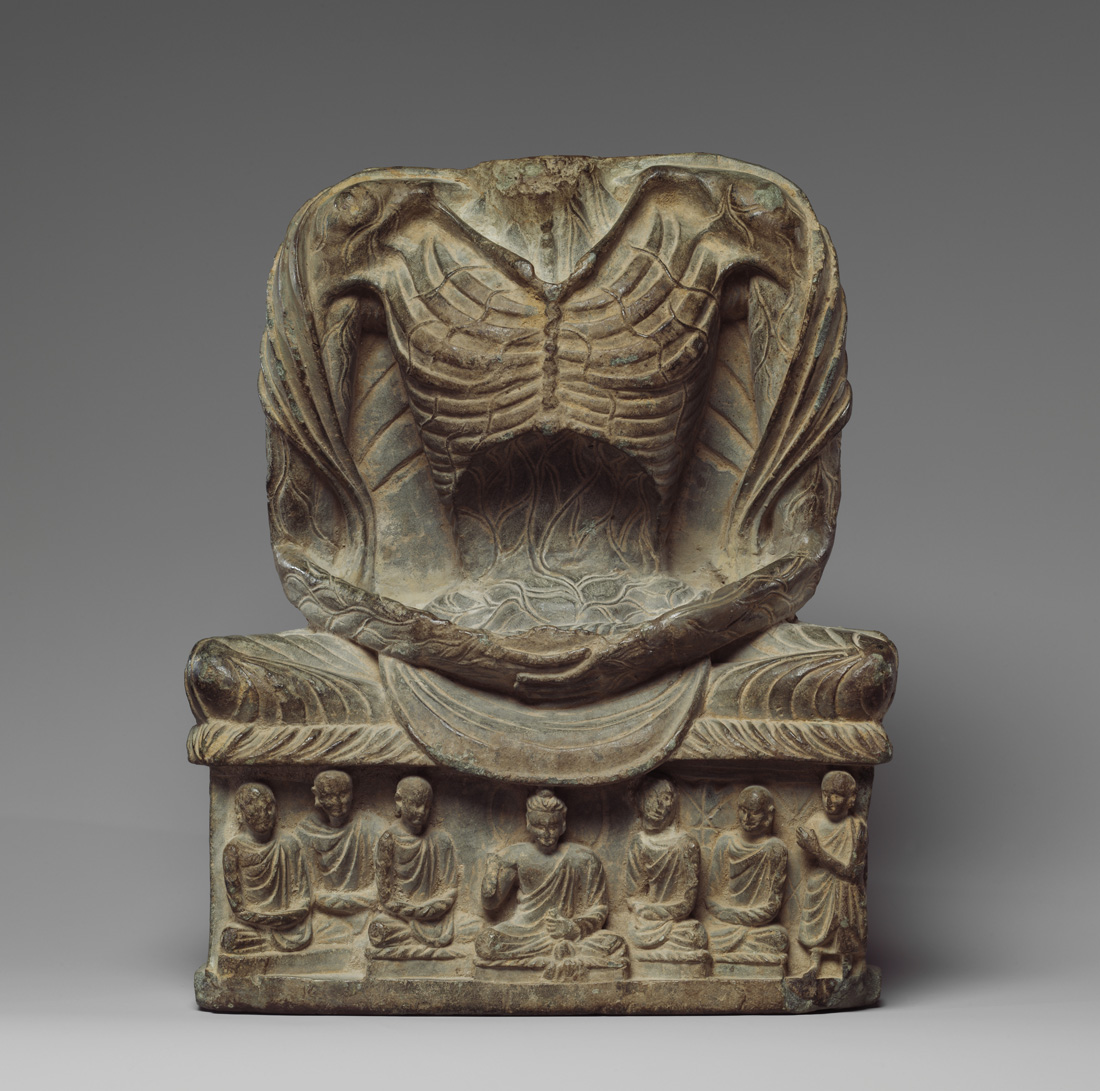
Fasting Siddhartha, Pakistan, c. third century. The Metropolitan Museum of Art.
I shall conclude this catalog of London dainties with table beer, guiltless of hops and malt, vapid and nauseous, much fitter to facilitate the operation of a vomit than to quench thirst and promote digestion; the tallowy rancid mass called butter, manufactured with candle grease and kitchen stuff; and their fresh eggs, imported from France and Scotland. Now, all these enormities might be remedied with a very little attention to the article of police or civil regulation, but the wise patriots of London have taken it into their heads that all regulation is inconsistent with liberty, and that every man ought to live in his own way, without restraint. Nay, as there is not sense enough left among them to be discomposed by the nuisances I have mentioned, they may, for aught I care, wallow in the mire of their own pollution.

Tobias Smollett
From The Expedition of Humphry Clinker. Smollett joined the Royal Navy at the age of nineteen as a surgeon’s second mate, and in 1741 he landed in Jamaica, where he abandoned his duties and later met his future wife. Returning to London in 1744 to start his own practice, he published in 1748 his first novel, The Adventures of Roderick Random, drawing heavily upon his naval experiences. His translation of Don Quixote appeared in 1755.
